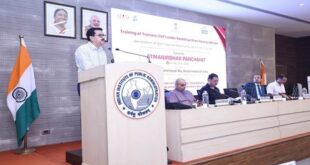Context:
Recently, the ICMR Bioethics Unit posted the consensus policy statement for the ethical conduct of controlled human infection studies (CHIS), also known as human challenge studies, in India.
Key details:
- Traditional human clinical trials have been carried out in the country for a very long time.
- The inclusion of human challenge studies will help supplement traditional clinical studies and speed up the process of finding safe and effective interventions in the form of drugs and/or vaccines.
- Human challenge studies will vastly help in providing better insight into multiple aspects of even well-studied pathogens, infection, transmission, disease pathogenesis and prevention.
- Since many infectious diseases are endemic in several developing countries, and resistance to existing drugs is increasing, there is a pressing need to find more effective medical interventions.
About human challenge studies:
- Human challenge studies are those studies in which human beings are exposed to diseases to learn more about it.
- However, India has not undertaken such trials before.
- Human challenge studies are almost always conducted to understand the various facets of infectious microbes and the diseases or conditions caused by such pathogens.
Difference between Human challenge studies and Traditional human clinical trials:
Nature of exposure:
- The fundamental difference between the two scientific methods is the nature of exposure to pathogens by participants.
- Participants in traditional clinical trials are strongly advised to adopt and adhere to safety measures to avoid getting infected and infection is left to chance.
- Volunteers in a human challenge study are deliberately exposed to disease-causing pathogens.
Difference in kind of study:
- Traditional clinical trials are undertaken to study the safety and efficacy of drugs and vaccines.
- Human challenge studies are carried out to understand the various facets of infection and disease pathogenesis besides selecting the best candidate drug or vaccine.
Associated risks:
- The adverse effects of the candidate drugs or vaccines are not known in both the studies.
- Volunteers in a human challenge trial face an additional risk when deliberately exposed to the pathogen.
Types of diseases studied:
Human challenge studies are often undertaken to study “less deadly diseases” such as influenza, dengue, typhoid, cholera and malaria, unlike in traditional clinical studies.
Ethical dimensions of human challenge trial:
Associated health risks:
- That participants in a human challenge trial are deliberately exposed to a disease-causing pathogen makes it ethically more challenging.
- The ICMR consensus statement has clearly mentioned that only healthy individuals in the 18-45 years age bracket are to be enrolled.
- Participants with pre-existing medical conditions are to be excluded but very often people are unaware of many medical conditions.
- This makes it essential to carry out detailed medical examination of the participants before enrolment.
Way forward:
- The disease must be important, with high morbidity and/or mortality, or at least a high prevalence.
- The study must address an important unanswered question.
- The proposed intervention should have a reasonable prospect of success.
- Alternative methods of giving an adequate answer to the trial question should be ruled out.
SOURCE: THE HINDU, THE ECONOMIC TIMES, PIB
 Chinmaya IAS Academy – Current Affairs Chinmaya IAS Academy – Current Affairs
Chinmaya IAS Academy – Current Affairs Chinmaya IAS Academy – Current Affairs



